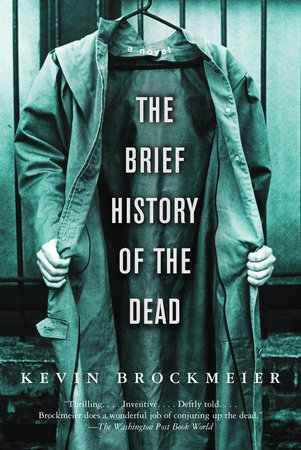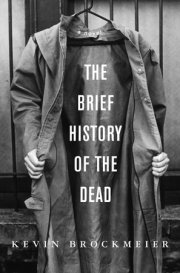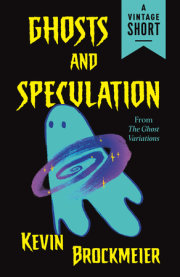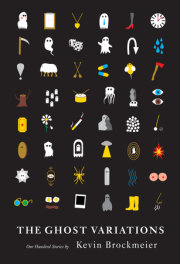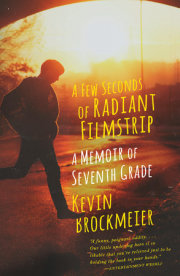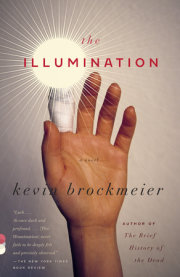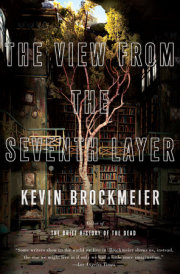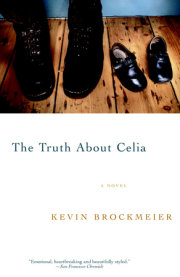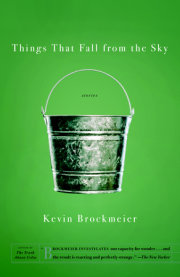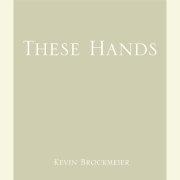CHAPTER ONE
THE CITY
When the blind man arrived in the city, he claimed that he had traveled across a desert of living sand. First he had died, he said, and then–snap!–the desert. He told the story to everyone who would listen, bobbing his head to follow the sound of their footsteps. Showers of red grit fell from his beard. He said that the desert was bare and lonesome and that it had hissed at him like a snake. He had walked for days and days, until the dunes broke apart beneath his feet, surging up around him to lash at his face. Then everything went still and began to beat like a heart. The sound was as clear as any he had ever heard. It was only at that moment, he said, with a million arrow points of sand striking his skin, that he truly realized he was dead.
Jim Singer, who managed the sandwich shop in the monument district, said that he had felt a prickling sensation in his fingers and then stopped breathing. "It was my heart," he insisted, thumping firmly on his chest. "Took me in my own bed." He had closed his eyes, and when he opened them again, he was on a train, the kind that trolleys small children around in circles at amusement parks. The rails were leading him through a thick forest of gold-brown trees, but the trees were actually giraffes, and their long necks were reaching like branches into the sky. A wind rose up and peeled the spots from their backs. The spots floated down around him, swirling and dipping in the wake of the train. It took him a long time to understand that the throbbing noise he heard was not the rattling of the wheels along the tracks.
The girl who liked to stand beneath the poplar tree in the park said that she had died into an ocean the color of dried cherries. For a while the water had carried her weight, she said, and she had lain on her back turning in meaningless circles, singing the choruses of the pop songs she remembered. But then there was a drum of thunder, and the clouds split open, and the ball bearings began to pelt down around her–tens of thousands of them. She had swallowed as many as she could, she said, stroking the cracked trunk of the poplar tree. She didn't know why. She filled like a canvas sack and sank slowly through the layers of the ocean. Shoals of fish brushed past her, their blue and yellow scales the single brightest thing in the water. And all around her she heard that sound, the one that everybody heard, the regular pulsing of a giant heart.
The stories people told about the crossing were as varied and elaborate as their ten billion lives, so much more particular than those other stories, the ones they told about their deaths. After all, there were only so many ways a person could die: either your heart took you, or your head took you, or it was one of the new diseases. But no one followed the same path over the crossing. Lev Paley said that he had watched his atoms break apart like marbles, roll across the universe, then gather themselves together again out of nothing at all. Hanbing Li said that he woke inside the body of an aphid and lived an entire life in the flesh of a single peach. Graciella Cavazos would say only that she began to snow–four words–and smile bashfully whenever anyone pressed her for details.
No two reports were ever the same. And yet always there was the drumlike thumping noise.
Some people insisted that it never went away, that if you concentrated and did not turn your ear from the sound, you could hear it faintly behind everything in the city–the brakes and the horns, the bells on the doors of restaurants, the clicking and slapping of different kinds of shoes on the pavement. Groups of people came together in parks or on rooftops just to listen for it, sitting quietly with their backs turned to one another.
Ba-dum. Ba-dum. Ba-dum. It was like trying to keep a bird in sight as it lifted, blurred, and faded to a dot in the sky.
Luka Sims had found an old mimeograph machine his very first week in the city and decided to use it to produce a newspaper. He stood outside the River Road Coffee Shop every morning, handing out the circulars he had printed. One particular issue of the
L. Sims News & Speculation Sheet–or the
Sims Sheet, as people called it–addressed the matter of this sound. Fewer than twenty percent of the people Luka interviewed claimed that they could still hear it after the crossing, but almost everyone agreed that it resembled nothing so much as–could be nothing other than–the pounding of a heart. The question, then, was, Where did it come from? It could not be their own hearts, for their hearts no longer beat. The old man Mahmoud Qassim believed that it was not the actual sound of his heart, but the remembered sound, which, because he had both heard and failed to notice it for so long, still resounded in his ears. The woman who sold bracelets by the river thought that it was the heartbeat at the center of the world, that bright, boiling place she had fallen through on her way to the city. "As for this reporter," the article concluded, "I hold with the majority. I have always suspected that the thumping sound we hear is the pulse of those who are still alive. The living carry us inside them like pearls. We survive only so long as they remember us." It was an imperfect metaphor–Luka knew that–since the pearl lasts much longer than the oyster. But rule one in the newspaper business was that you had to meet your deadlines. He had long since given up the quest for perfection.
There were more people in the city every day, and yet the city never failed to accommodate them. You might be walking down a street you had known for years, and all of a sudden you would come upon another building, another whole block. Carson McCaughrean, who drove one of the sleek black taxis that roamed the streets, had to redraw his maps once a week. Twenty, thirty, fifty times a day, he would pick up a fare who had only recently arrived in the city and have to deliver him somewhere he–Carson–had never heard of. They came from Africa, Asia, Europe, and the Americas. They came from churning metropolises and from small islands in the middle of the ocean. That was what the living did: they died. There was an ancient street musician who began playing in the red brick district as soon as he reached the city, making slow, sad breaths with his accordion. There was a jeweler, a young man, who set up shop at the corner of Maple and Christopher Streets and sold diamonds that he mounted on silver pendants. Jessica Auffert had operated her own jewelry shop on the same corner for more than thirty years, but she did not seem to resent the man, and in fact brought him a mug of fresh black coffee every morning, exchanging gossip as she drank with him in his front room. What surprised her was how young he was–how young so many of the dead were these days. Great numbers of them were no more than children, who clattered around on skateboards or went racing past her window on their way to the playground. One, a boy with a strawberry discoloration on his cheek, liked to pretend that the rocking horses he tossed himself around on were real horses, the horses he had brushed and fed on his farm before they were killed in the bombing. Another liked to swoop down the slide over and over again, hammering his feet into the gravel as he thought about his parents and his two older brothers, who were still alive. He had watched them lift free of the same illness that had slowly sucked him under. He did not like to talk about it.
This was during a war, though it was difficult for any of them to remember which one.
* * *
Occasionally one of the dead, someone who had just completed the crossing, would mistake the city for heaven. It was a misunderstanding that never persisted for long. What kind of heaven had the blasting sound of garbage trucks in the morning, and chewing gum on the pavement, and the smell of fish rotting by the river? What kind of hell, for that matter, had bakeries and dogwood trees and perfect blue days that made the hairs on the back of your neck rise on end? No, the city was not heaven, and it was not hell, and it certainly was not the world. It stood to reason, then, that it had to be something else. More and more people came to adopt the theory that it was an extension of life itself–a sort of outer room–and that they would remain there only so long as they endured in living memory. When the last person who had actually known them died, they would pass over into whatever came next. It was true that most of the city's occupants went away after sixty or seventy years, and while this did not prove the theory, it certainly served to nourish it. There were stories of men and women who had been in the city much longer, for centuries and more, but there were always such stories, in every time and place, and who knew whether to believe them?
Every neighborhood had its gathering spot, a place where people could come together to trade news of the other world. There was the colonnade in the monument district, and the One and Only Tavern in the warehouse district, and right next to the greenhouse, in the center of the conservatory district, was Andrei Kalatozov's Russian Tea Room. Kalatozov poured the tea he brewed from a brass samovar into small porcelain cups that he served on polished wooden platters. His wife and daughter had died a few weeks before he did, in an accident involving a land mine they had rooted up out of the family garden. He was watching through the kitchen window when it happened. His wife's spade struck a jagged hunk of metal, so cankered with rust from its century underground that he did not realize what it was until it exploded. Two weeks later, when he put the razor to his throat, it was with the hope that he would be reunited with his family in heaven. And, sure enough, there they were–his wife and daughter–smiling and taking coats at the door of the tea room. Kalatozov watched them as he sliced a lemon into wedges and arranged the wedges on a saucer. He was the happiest man in the room–the happiest man in any room. The city may not have been heaven, but it was heaven enough for him. Morning to evening, he listened to his customers as they shared the latest news about the war. The Americans and the Middle East had resumed hostilities, as had China and Spain and Australia and the Netherlands. Brazil was developing another mutagenic virus, one that would resist the latest antitoxins. Or maybe it was Italy. Or maybe Indonesia. There were so many rumors that it was hard to know for sure.
Now and then someone who had died only a day or two before would happen into one of the centers of communication–the tavern or the tea room, the river market or the colonnade–and the legions of the dead would mass around him, shouldering and jostling him for information. It was always the same: "Where did you live?" "Do you know anything about Central America?" "Is it true what they're saying about the ice caps?" "I'm trying to find out about my cousin. He lived in Arizona. His name was Lewis Zeigler, spelled L-e-w-i-s…" "What's happening with the situation along the African coast--do you know, do you know?" "Anything you can tell us, please, anything at all."
Kiran Patel had sold beads to tourists in the Bombay hotel district for most of a century. She said that there were fewer and fewer travelers to her part of the world, but that this hardly mattered, since there was less and less of her part of the world for them to see. The ivory beads she had peddled as a young woman had become scarce, then rare, then finally unobtainable. The only remaining elephants were caged away in the zoos of other countries. In the years just before she died, the "genuine ivory beads" she sold were actually a cream-colored plastic made in batches of ten thousand in Korean factories. This, too, hardly mattered. The tourists who stopped at her kiosk could never detect the difference.
Jeffrey Fallon, sixteen and from Park Falls, Wisconsin, said that the fighting hadn't spread in from the coasts yet, but that the germs had, and he was living proof. "Or not living, maybe, but still proof," he corrected himself. The bad guys used to be Pakistan, and then they were Argentina and Turkey, and after that he had lost track. "What do you want me to tell you?" he asked, shrugging his shoulders. "Mostly I just miss my girlfriend." Her name was Tracey Tipton, and she did this thing with his earlobes and the notched edge of her front teeth that made his entire body go taut and buzz like a guitar string. He had never given his earlobes a second thought until the day she took them between her lips, but now that he was dead he thought of nothing else. Who would have figured?
The man who spent hours riding up and down the escalators in the Ginza Street Shopping Mall would not give his name. When people asked him what he remembered about the time before he died, he would only nod vigorously, clap his hands together, and say, "Boom!," making a gesture like falling confetti with his fingertips.
Excerpted from The Brief History of the Dead by Kevin Brockmeier Copyright © 2006 by Kevin Brockmeier. Excerpted by permission of Pantheon, a division of Random House, Inc. All rights reserved. No part of this excerpt may be reproduced or reprinted without permission in writing from the publisher.
Copyright © 2006 by Kevin Brockmeier. All rights reserved. No part of this excerpt may be reproduced or reprinted without permission in writing from the publisher.

